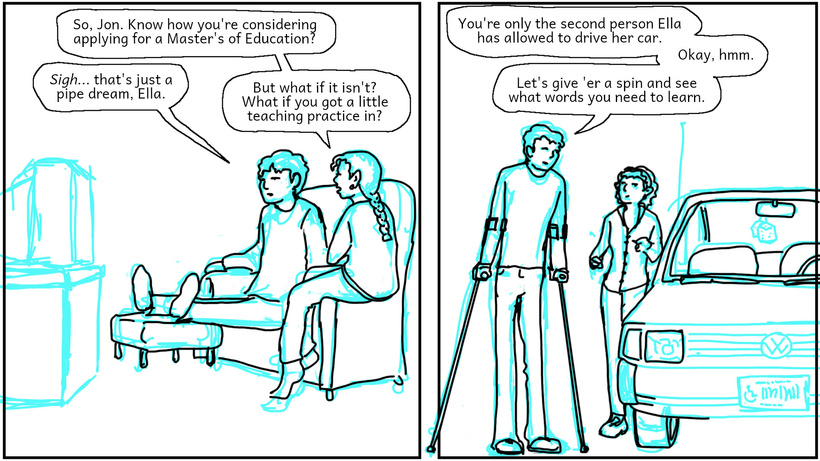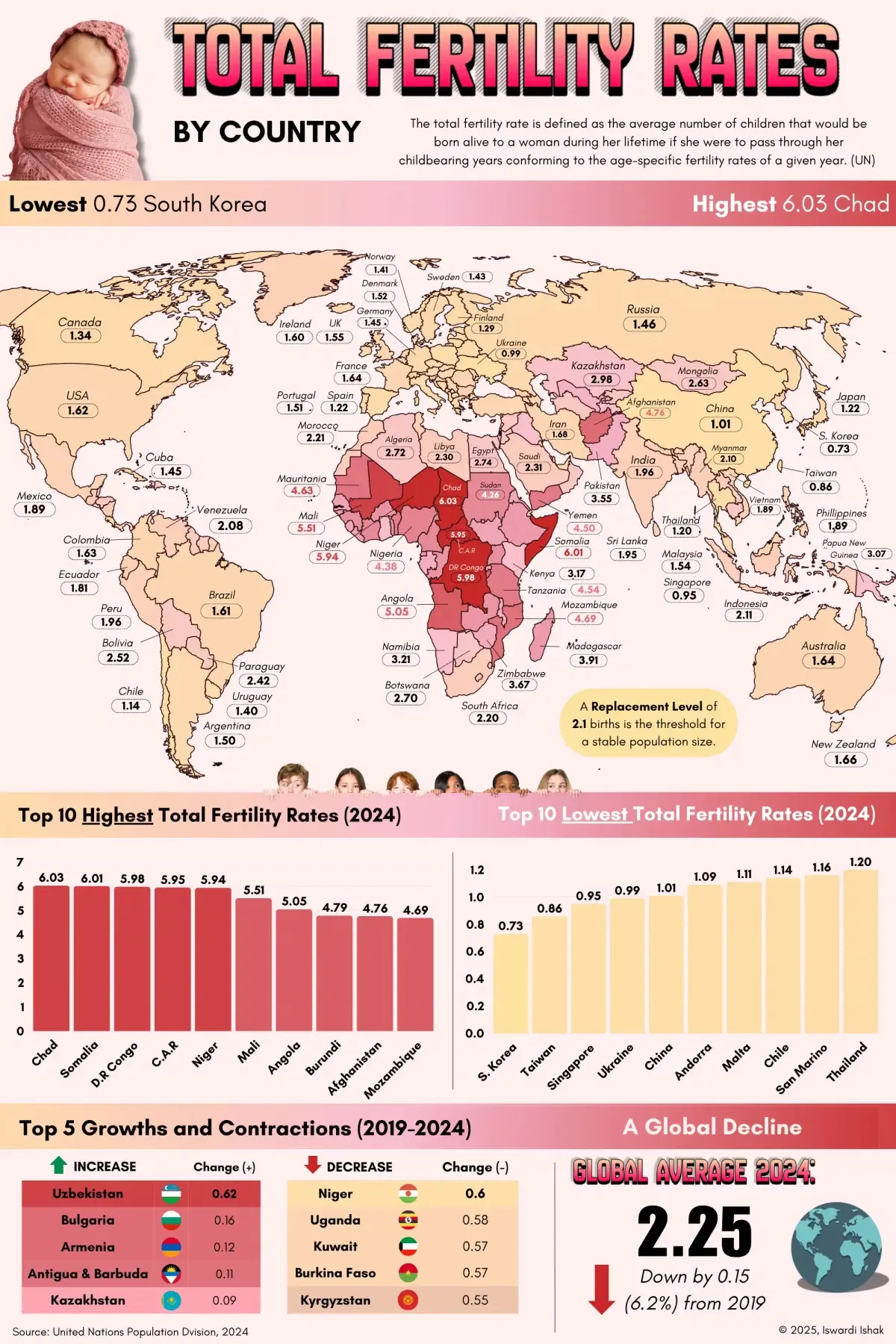Alien Romance, the daily comic strip

Jon is sitting on the couch, watching TV. I should've drawn his crutches in there. I keep intending to go back into panels and draw either his crutches or wheelchair, whichever is appropriate, while he's sitting on the couch. Ella comes to bother him.
"So, Jon," she says. "Know how you're considering applying for a Master's of Education?"
Jon sighs. "That's just a pipe dream, Ella."
"But what if it isn't?" insists Ella. "What if you got a little teaching practice in?"
Now Jon is standing on the sidewalk beside Ella's VW Rabbit. Cathy is awkwardly holding the keys. "You're only the second person Ella has allowed to drive her car," Jon observes. "Okay, hmm. Let's give 'er a spin and see what words you need to learn."
***
Jon's friendship with Cathy is a whole story arc unto itself. He's a very verbal communication oriented person, although he's not particularly talkative himself. He just insists on things being stated clearly, and resents confusion. Cathy, meanwhile, is a whirlwind of chaos. Sort of. She's only as chaotic as I am - internally consistent, but not up to the clarity standards of the people around her. So how do these two connect?
It might be that Jon perceives Cathy as a challenge, and one he takes very seriously. Can he find common ground with his good friend's new wife, even if they can't properly converse?
Also, talking to her is like talking to a dog; she's warmly attentive but can't understand very much of what he says. The perfect confidant! Maybe?
And what does Cathy see in Jon? Maybe she sees nonthreatening masculinity. In the book, Cathy has run-ins a couple of times with men that end up going badly for her, to the point where she actually tells Maurice that she's afraid to try again. (In French, and it goes right over his head.)




 Total fertility rate is defined as the average number of children that would be born alive to a woman during her lifetime if she were to pass through her childbearing years conforming to the age-specific fertility rates of a given year.
Total fertility rate is defined as the average number of children that would be born alive to a woman during her lifetime if she were to pass through her childbearing years conforming to the age-specific fertility rates of a given year. Chad
Chad Somalia
Somalia DR Congo
DR Congo Central African Republic
Central African Republic Niger
Niger Mali
Mali Angola
Angola Burundi
Burundi Afghanistan
Afghanistan Mozambique
Mozambique Mauritania
Mauritania Mayotte
Mayotte Tanzania
Tanzania Yemen
Yemen Benin
Benin Nigeria
Nigeria Sudan
Sudan Cameroon
Cameroon Côte d’Ivoire
Côte d’Ivoire Uganda
Uganda Guinea
Guinea Togo
Togo Equatorial Guinea
Equatorial Guinea Burkina Faso
Burkina Faso Republic of the Congo
Republic of the Congo Zambia
Zambia Madagascar
Madagascar Ethiopia
Ethiopia Gambia
Gambia Liberia
Liberia Comoros
Comoros Samoa
Samoa South Sudan
South Sudan Senegal
Senegal Guinea-Bissau
Guinea-Bissau Sierra Leone
Sierra Leone Eritrea
Eritrea Zimbabwe
Zimbabwe Rwanda
Rwanda São Tomé & Príncipe
São Tomé & Príncipe Gabon
Gabon Malawi
Malawi Vanuatu
Vanuatu Pakistan
Pakistan Solomon Islands
Solomon Islands Uzbekistan
Uzbekistan Ghana
Ghana French Guiana
French Guiana Nauru
Nauru Palestine
Palestine Iraq
Iraq Namibia
Namibia Tuvalu
Tuvalu Kenya
Kenya Kiribati
Kiribati Tonga
Tonga Papua New Guinea
Papua New Guinea Tajikistan
Tajikistan Kazakhstan
Kazakhstan Marshall Islands
Marshall Islands Micronesia
Micronesia Israel
Israel Kyrgyzstan
Kyrgyzstan Guam
Guam Egypt
Egypt Algeria
Algeria Eswatini
Eswatini Botswana
Botswana Syria
Syria Lesotho
Lesotho Turkmenistan
Turkmenistan Mongolia
Mongolia Timor-Leste
Timor-Leste Haiti
Haiti Djibouti
Djibouti Jordan
Jordan Cambodia
Cambodia Bolivia
Bolivia Oman
Oman Honduras
Honduras Paraguay
Paraguay Laos
Laos Guyana
Guyana Saudi Arabia
Saudi Arabia Libya
Libya Guatemala
Guatemala Fiji
Fiji American Samoa
American Samoa Suriname
Suriname Lebanon
Lebanon Faroe Islands
Faroe Islands Dominican Republic
Dominican Republic Morocco
Morocco Nicaragua
Nicaragua South Africa
South Africa Western Sahara
Western Sahara Réunion
Réunion Bangladesh
Bangladesh Indonesia
Indonesia Seychelles
Seychelles Panama
Panama Monaco
Monaco Myanmar
Myanmar U.S. Virgin Islands
U.S. Virgin Islands Venezuela
Venezuela Belize
Belize Peru
Peru India
India Nepal
Nepal Sri Lanka
Sri Lanka Greenland
Greenland Vietnam
Vietnam Philippines
Philippines Mexico
Mexico Palau
Palau Tunisia
Tunisia Ecuador
Ecuador Bahrain
Bahrain Georgia
Georgia Montenegro
Montenegro North Korea
North Korea El Salvador
El Salvador Bulgaria
Bulgaria Brunei
Brunei Moldova
Moldova Qatar
Qatar Armenia
Armenia Romania
Romania Barbados
Barbados Iran
Iran New Zealand
New Zealand Australia
Australia France
France Colombia
Colombia United States
United States Turkey
Turkey Brazil
Brazil Ireland
Ireland Slovenia
Slovenia Slovakia
Slovakia Maldives
Maldives United Kingdom
United Kingdom Malaysia
Malaysia Liechtenstein
Liechtenstein Trinidad & Tobago
Trinidad & Tobago Denmark
Denmark Kuwait
Kuwait Portugal
Portugal Argentina
Argentina Serbia
Serbia Bosnia & Herzegovina
Bosnia & Herzegovina Hungary
Hungary Croatia
Croatia North Macedonia
North Macedonia Russia
Russia Czechia
Czechia Bhutan
Bhutan Germany
Germany Cuba
Cuba Switzerland
Switzerland Netherlands
Netherlands Sweden
Sweden Norway
Norway Luxembourg
Luxembourg Uruguay
Uruguay Belgium
Belgium Cyprus
Cyprus Estonia
Estonia Jamaica
Jamaica Canada
Canada Latvia
Latvia Albania
Albania Greece
Greece Austria
Austria Costa Rica
Costa Rica Poland
Poland Finland
Finland Mauritius
Mauritius Spain
Spain Belarus
Belarus Japan
Japan United Arab Emirates
United Arab Emirates Lithuania
Lithuania Italy
Italy Thailand
Thailand San Marino
San Marino Chile
Chile Malta
Malta Andorra
Andorra China
China Ukraine
Ukraine Singapore
Singapore Puerto Rico
Puerto Rico Taiwan
Taiwan South Korea
South Korea Hong Kong (SAR)
Hong Kong (SAR) Macau (SAR)
Macau (SAR) Global Average
Global Average







